


This article highlights the early signs of heart failure in adults, focusing on the critical importance of recognizing symptoms such as shortness of breath, swelling, and fatigue. Have you ever felt an unusual heaviness in your chest or noticed yourself getting tired more easily? These signs can be subtle yet significant indicators of heart health.
Timely recognition and communication of these symptoms are essential, as they can lead to better health outcomes and effective management of cardiovascular health, especially for elderly patients who are at a higher risk.
In addition to this, understanding these symptoms can empower you to take control of your health. By being aware and proactive, you can engage in conversations with your healthcare provider, ensuring that your concerns are addressed. Remember, you are not alone in this journey; support is available to help you navigate your health challenges.
Ultimately, recognizing the signs of heart failure is a crucial step towards better health. By staying informed and seeking help when needed, you can significantly improve your quality of life. Your heart deserves the best care, and taking these early signs seriously is a vital part of that care.
Recognizing the early signs of heart failure is crucial, especially as this condition becomes more prevalent among our older loved ones. Did you know that over 10% of individuals aged 70 and older are affected? Understanding these warning signals can empower you to seek timely medical intervention, potentially saving lives. However, many remain unaware of the subtle symptoms that can indicate heart distress, which may lead to delayed treatment and worsening health outcomes. What are these early signs, and how can you take proactive steps to safeguard your heart health?
It's natural to feel concerned about your health, but being informed is the first step toward taking control. Early signs of heart failure may include:
If you notice any of these symptoms, please don't hesitate to reach out to a healthcare professional. Remember, seeking help is a sign of strength, and there are resources available to support you.
In addition to recognizing these symptoms, maintaining a heart-healthy lifestyle can make a significant difference. Simple changes, such as:
can help protect your heart. You are not alone in this journey, and there are many people who care about your well-being.
Ultimately, understanding and addressing these early signs can lead to better health outcomes and a higher quality of life. We encourage you to take these concerns seriously and reach out for support. Your heart deserves attention, and taking action today can pave the way for a healthier tomorrow.
At Amavita Heart and Vascular Health, we truly understand the concerns of our elderly patients, especially as the early signs of heart failure in adults become more prevalent, with heart failure exceeding 10% in those aged 70 and older. Our commitment to thorough failure management is designed to provide you with the best possible care. With our modern outpatient facilities, you can undergo advanced heart and vascular procedures and return home on the same day, allowing for greater comfort and faster recovery times.
We utilize advanced methods and minimally invasive procedures to significantly enhance your experience. Our focus is on creating individualized treatment strategies that address the unique health challenges faced by seniors, such as polypharmacy and frailty. This ensures that you receive personalized care tailored to your specific needs.
Our dedication to compassionate, personalized care, combined with access to innovative clinical trials through Amavita Research Services, positions us as a trusted leader in cardiovascular health within the Miami community. We are committed to improving your quality of life, and our cardiologists emphasize that incorporating advanced methods in cardiac distress treatment is vital for achieving better outcomes in this at-risk group.
We invite you to reach out and explore how we can support your heart and vascular health journey. Your well-being is our priority, and we are here to .
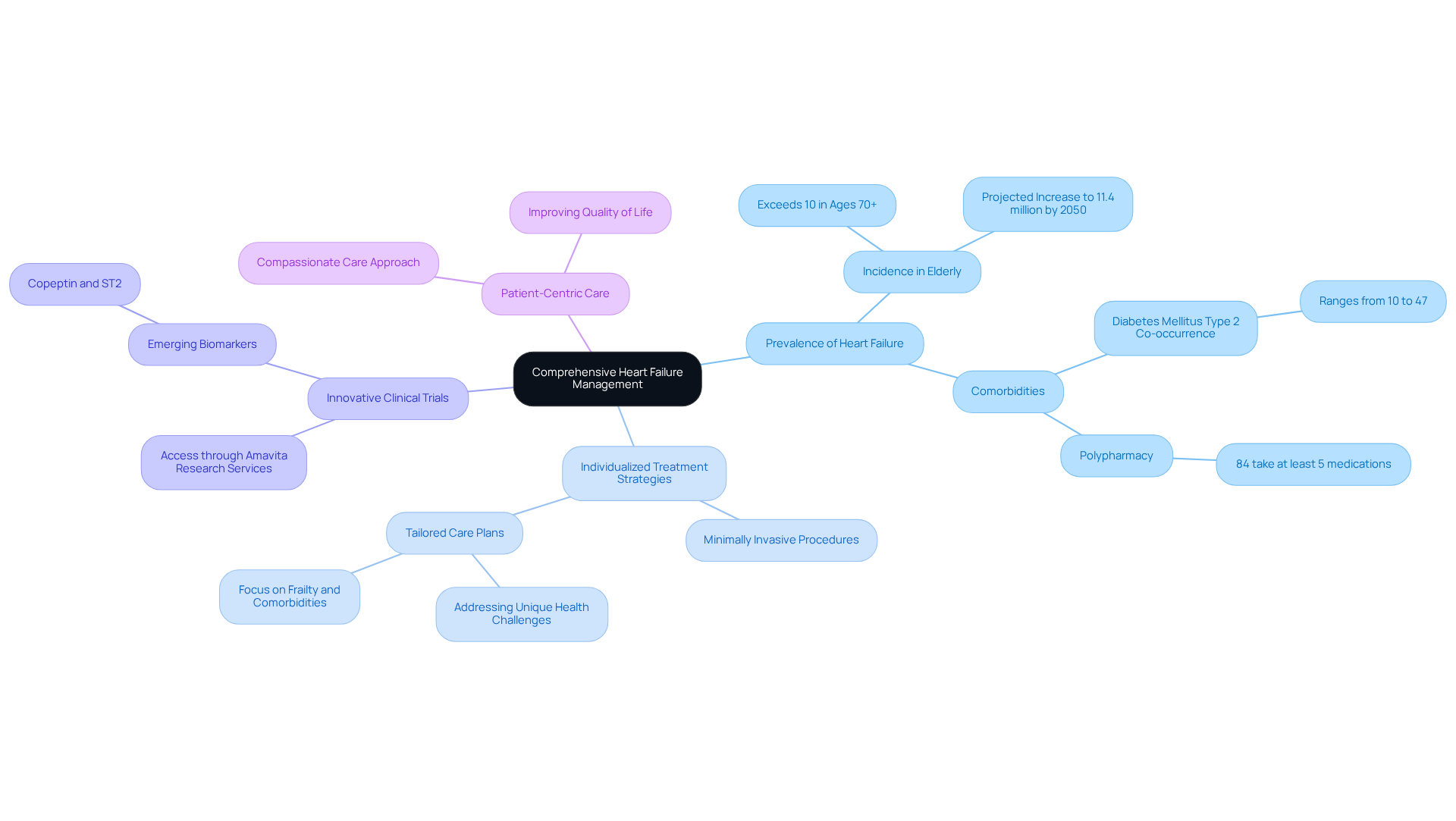
Shortness of breath, or dyspnea, is a common concern that many experience, especially those showing early signs of heart failure in adults. It can occur during physical activity and, in more advanced cases, even while at rest. This symptom can be especially alarming for our senior patients, as the in adults significantly increase after the age of 65. Recent research reveals that dyspnea is often influenced by somatic symptoms of depression and anxiety, which can heighten the feeling of breathlessness. Furthermore, shortness of breath may indicate underlying valve disease, where the heart's valves do not function properly, forcing the heart to work harder. If left untreated, valve disease can lead to serious complications, including cardiac dysfunction.
At Amavita Heart and Vascular Health, Dr. Martinez-Clark offers specialized care through minimally invasive valve treatments. These procedures can repair or replace damaged valves without the need for open-heart surgery, often leading to remarkable improvements in breathing and energy levels. It is vital for patients to be attentive to any changes in their breathing patterns, as these may indicate early signs of heart failure in adults, and to communicate these changes with their healthcare provider promptly.
Addressing dyspnea not only enhances quality of life but also supports effective management of overall health, particularly when psychological factors are considered. Key predictors of dyspnea include:
By recognizing and responding to this important signal—whether by seeking medical advice when concerns arise or by engaging in moderate physical activity—patients can achieve timely interventions and better health outcomes. Remember, you are not alone in this journey, and support is always available.

Swelling in the legs, ankles, or abdomen can be considered one of the early signs of heart failure in adults, often resulting from the heart's diminished ability to pump blood effectively, a condition known as edema. This symptom can progressively worsen, leading to if not addressed. It's particularly important for elderly patients, who are at a higher risk; current data shows that fluid retention is prevalent in this demographic, highlighting the need for vigilant monitoring.
Healthcare professionals stress the importance of recognizing the early signs of heart failure in adults. As one expert wisely notes, 'Leg swelling lasting more than a few days warrants a visit to your doctor.' This proactive approach is essential for timely intervention and effective management of cardiac dysfunction.
Patients are encouraged to monitor their weight closely, as sudden changes can indicate worsening fluid retention. Reporting any significant fluctuations to a healthcare provider is crucial for adjusting treatment plans and preventing further complications. Remember, swelling not only impacts your physical comfort but can also complicate cardiac management. It’s vital for patients to engage in open communication with their healthcare teams about any changes in their condition, ensuring you feel supported every step of the way.

A persistent cough, particularly one that produces pink or frothy mucus, serves as an important warning sign of fluid buildup in the lungs, often associated with heart issues. This symptom arises when the heart struggles to pump blood effectively, leading to increased pressure in the pulmonary circulation and fluid leaking into the lung tissues. Recent studies have shown that such coughs can indicate worsening heart failure and may be linked to pulmonary edema, a serious condition that requires immediate medical attention.
At Amavita Heart and Vascular Health®, we understand how crucial it is to recognize this sign, as it can easily be confused with other respiratory problems. For instance, pulmonologists emphasize that a cough producing pink or frothy mucus is a significant indicator of pulmonary congestion, which calls for prompt evaluation to prevent further complications. Our comprehensive cardiac assessments utilize advanced risk evaluation tools and lifestyle modifications to address these issues effectively, providing personalized care tailored to your unique conditions and lifestyle.
It’s also important to be aware that over-the-counter decongestants can raise blood pressure and worsen cardiac problems, so they should be used cautiously. The lifetime risk of developing cardiac insufficiency for individuals aged 40 and over is 20%, underscoring the importance of recognizing the signs of cardiac insufficiency, especially among seniors. If you are experiencing this issue, please don’t hesitate to seek medical advice; timely intervention can greatly improve outcomes and enhance your quality of life. Understanding the connection between coughing and heart dysfunction is vital for the in adults and for the effective management of this chronic condition. Furthermore, any sudden changes in your symptoms should be communicated to your healthcare team to ensure proactive health management.
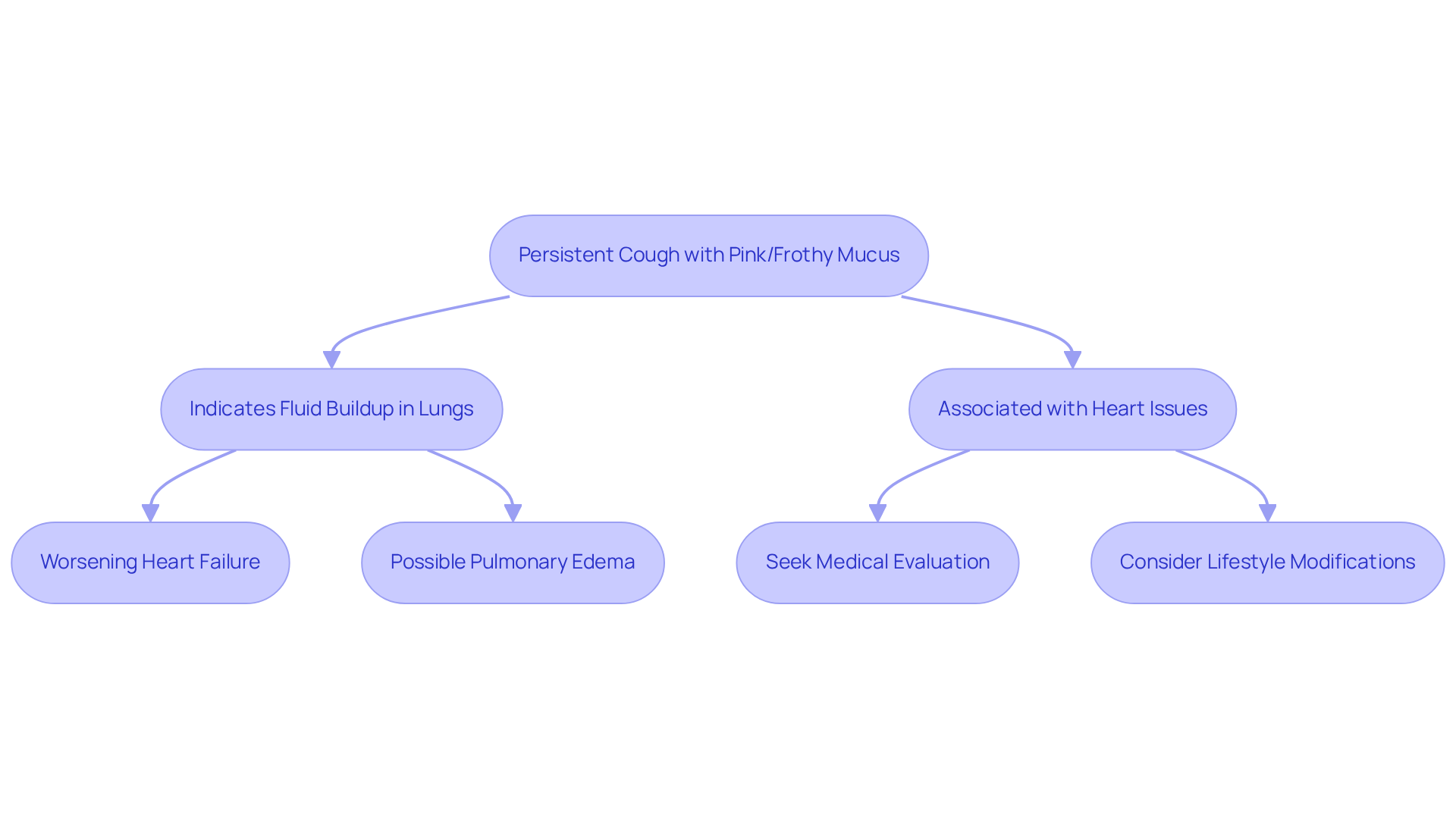
A sudden increase in weight can be concerning, especially if it exceeds 2-3 pounds in a single day or 5 pounds within a week. This may indicate fluid retention and the early signs of heart failure in adults. Regularly monitoring your weight is essential, as it helps in detecting early signs of heart failure in adults and other potential complications early on. Research shows that significant weight fluctuations often occur before hospital admissions, highlighting the importance of sharing any major changes with your healthcare provider.
By communicating these changes, you can work together to make timely adjustments to your treatment plan, particularly regarding diuretics and other medications. This proactive approach can help and improve your overall health outcomes. Remember, your health is a priority, and staying informed is a vital step in managing your well-being.

Unexplained fatigue and weakness can often be early signs that your heart is struggling to pump effectively, which may lead to reduced blood flow to essential muscles and organs. This situation can significantly impact energy levels, particularly in older individuals, who might notice a decline in their overall vitality. Recent studies highlight that exhaustion is a common experience among those facing cardiac distress, with many patients expressing it as one of their toughest challenges. Currently, around 6.7 million Americans over the age of 20 are living with heart failure, and with a lifetime risk of developing this condition now at 24%, it is crucial to recognize these early signs to maintain your quality of life.
At Amavita Heart and Vascular Health®, we understand how important it is to address persistent tiredness. We emphasize the value of comprehensive cardiac evaluations for individuals experiencing these symptoms. Our preventive cardiology strategy combines advanced risk evaluation tools with tailored interventions, ensuring that issues like fatigue are addressed promptly. Engaging in open discussions with your healthcare provider is vital, as this symptom may require further evaluation.
Healthcare experts at Amavita stress that addressing fatigue is essential for improving outcomes, leading to timely interventions and better management of cardiovascular issues. As Dr. Marat Fudim wisely notes, 'By focusing on these areas, we could enable better management to help people live longer and with a better quality of life.' Remember, you are not alone in this journey, and .
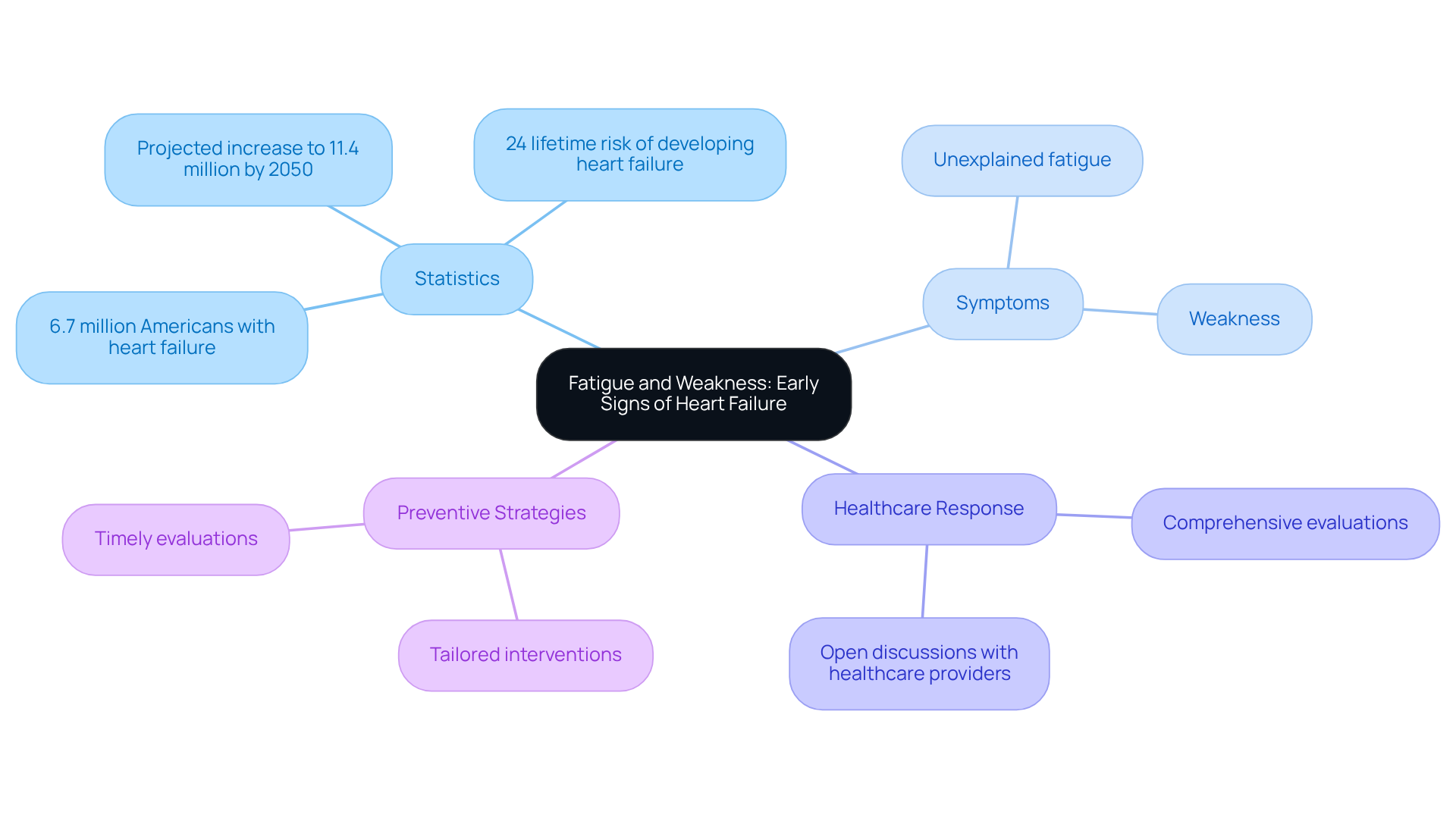
Patients with heart conditions often face significant challenges, including anxiety, depression, and feelings of isolation, which can deeply affect their overall health outcomes. It's concerning to note that nearly 30% of individuals with cardiac issues experience signs of depression, while anxiety disorders are prevalent in about 20% of this population. These emotional struggles can intensify physical symptoms and impede recovery, highlighting the critical need for healthcare providers to prioritize the assessment of .
Mental health professionals stress the importance of open communication about feelings, as this can lead to improved health outcomes. Addressing mental health concerns not only enhances quality of life but also fosters better adherence to treatment plans. As Michelle Obama wisely noted, "We would never tell someone with a broken leg that they should stop wallowing and get it together. We shouldn’t treat mental health conditions any differently."
Furthermore, the connection between mental well-being and cardiac dysfunction is increasingly recognized in medical settings. Studies reveal that unmanaged anxiety and depression can lead to poorer outcomes for cardiac patients, including elevated rates of hospitalizations and mortality. Therefore, integrating mental health support into the care strategy for individuals with cardiac issues is vital, ensuring they receive comprehensive treatment that addresses both their physical and emotional needs. If you or someone you know needs immediate support, please reach out to the Suicide & Crisis Lifeline at 988, which offers essential resources for those in distress.
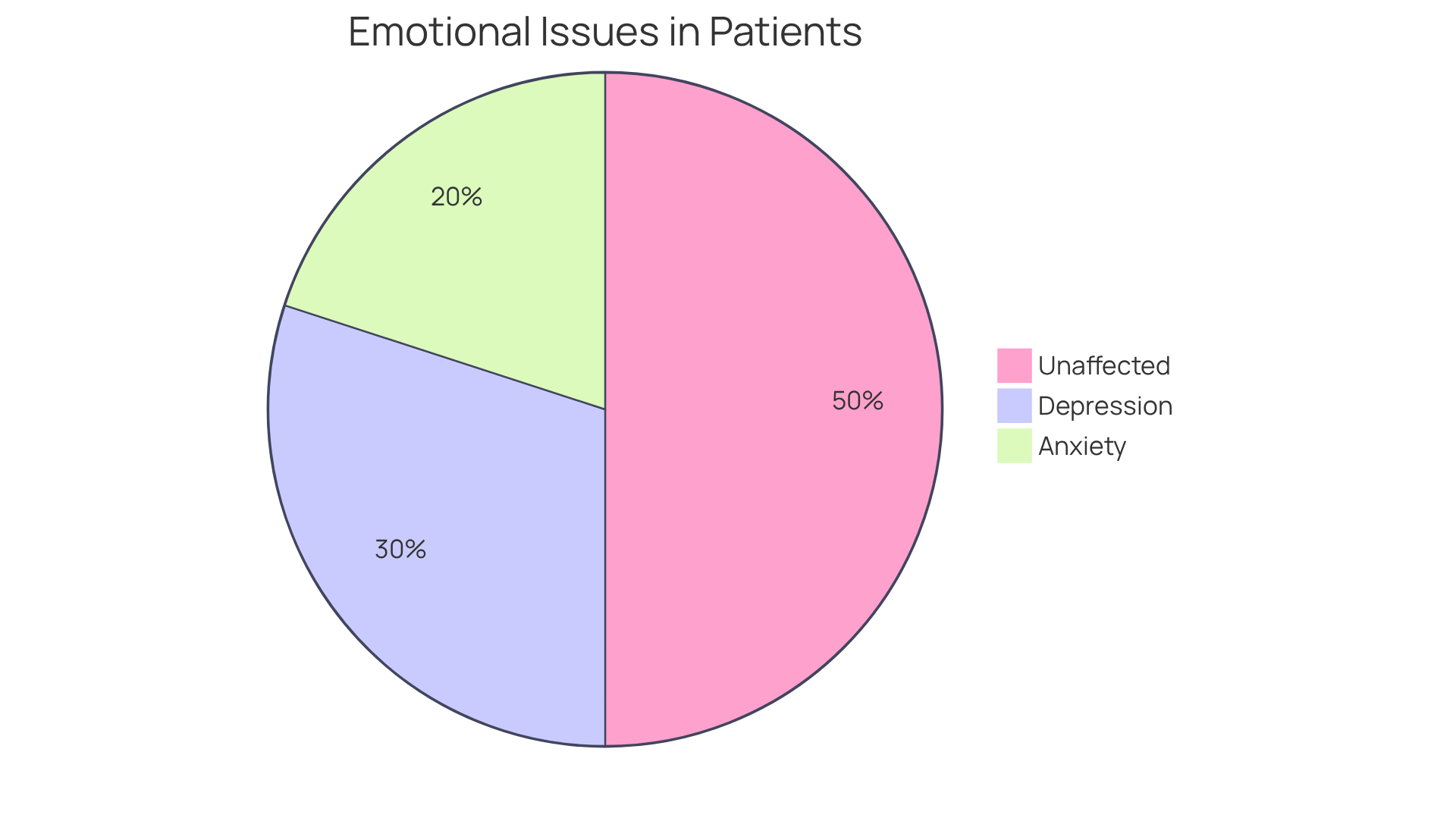
Sleep disturbances, particularly insomnia and sleep apnea, are unfortunately common among individuals with cardiac issues, significantly impacting their overall well-being. Have you ever noticed how restless nights can affect your daily life? Studies indicate that around 60% of people with cardiac dysfunction experience sleep problems, which can exacerbate symptoms like shortness of breath and fatigue. Insomnia is especially prevalent in this group, with research showing that chronic insomnia affects about 10% of adults, and this prevalence tends to increase with age.
Obstructive sleep apnea (OSA) is another serious concern, impacting approximately 4% of middle-aged men and 2% of middle-aged women. This condition is linked to higher risks of hypertension and cardiovascular illnesses, making it particularly relevant for those with heart issues. The connection between sleep disorders and cardiovascular health is complex; for instance, individuals suffering from severe restless legs syndrome are 2.32 times more likely to develop coronary artery disease.
Healthcare providers play a crucial role in observing and addressing sleep issues in cardiac patients. As Lisette A. Zuurbier, MSc, points out, "Clinical failure of the cardiovascular system, but not cardiac dysfunction assessed by echocardiography, elevates the risk of poor sleep quality in the general population over time." This highlights the importance of recognizing the two-way relationship between sleep quality and cardiovascular disease, which can create a harmful cycle that worsens both conditions. It is essential to tackle these sleep disturbances to improve patient outcomes, and they should be a vital component of any comprehensive treatment plan.
If you are experiencing sleep problems, please don’t hesitate to discuss them with your healthcare provider. Together, you can explore effective solutions that can lead to . Remember, you are not alone in this journey, and support is available to help you through.
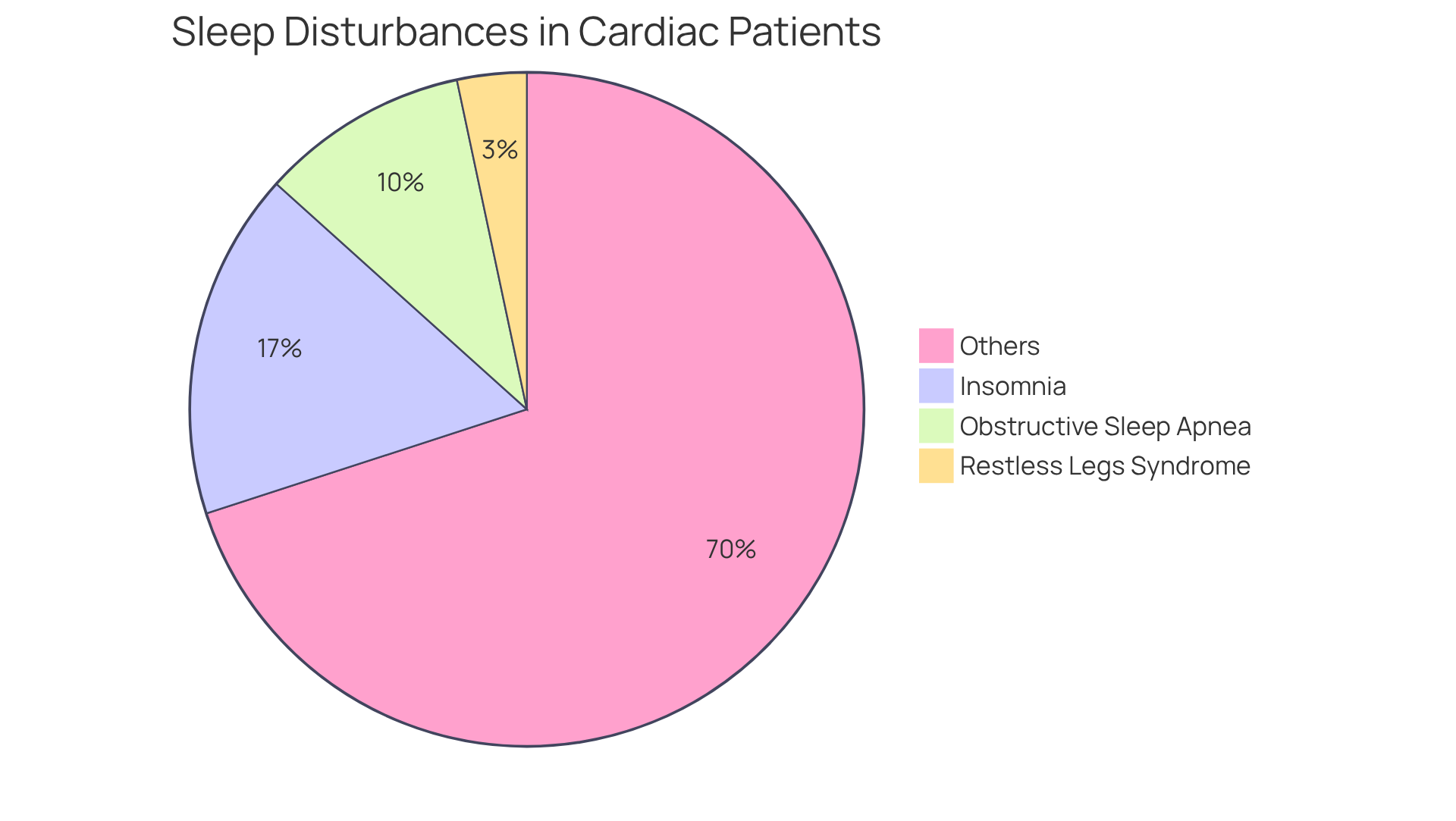
A reduction in appetite or sudden changes in eating habits can be concerning as they may be early signs of heart failure in adults. It’s important for patients to be aware of their dietary intake and to share any significant changes with their healthcare providers. Nutrition plays a vital role in managing cardiovascular health. At Amavita Heart and Vascular Health®, we truly understand the importance of thorough cardiac evaluations to identify risk factors early on.
In addition to this, our preventive cardiology approach combines advanced risk assessment tools with personalized interventions. This strategy not only addresses dietary concerns but also promotes . By developing tailored plans, we aim to significantly reduce the risk of cardiac events and enhance the quality of life for those we care for. Remember, you are not alone on this journey; we are here to support you every step of the way.
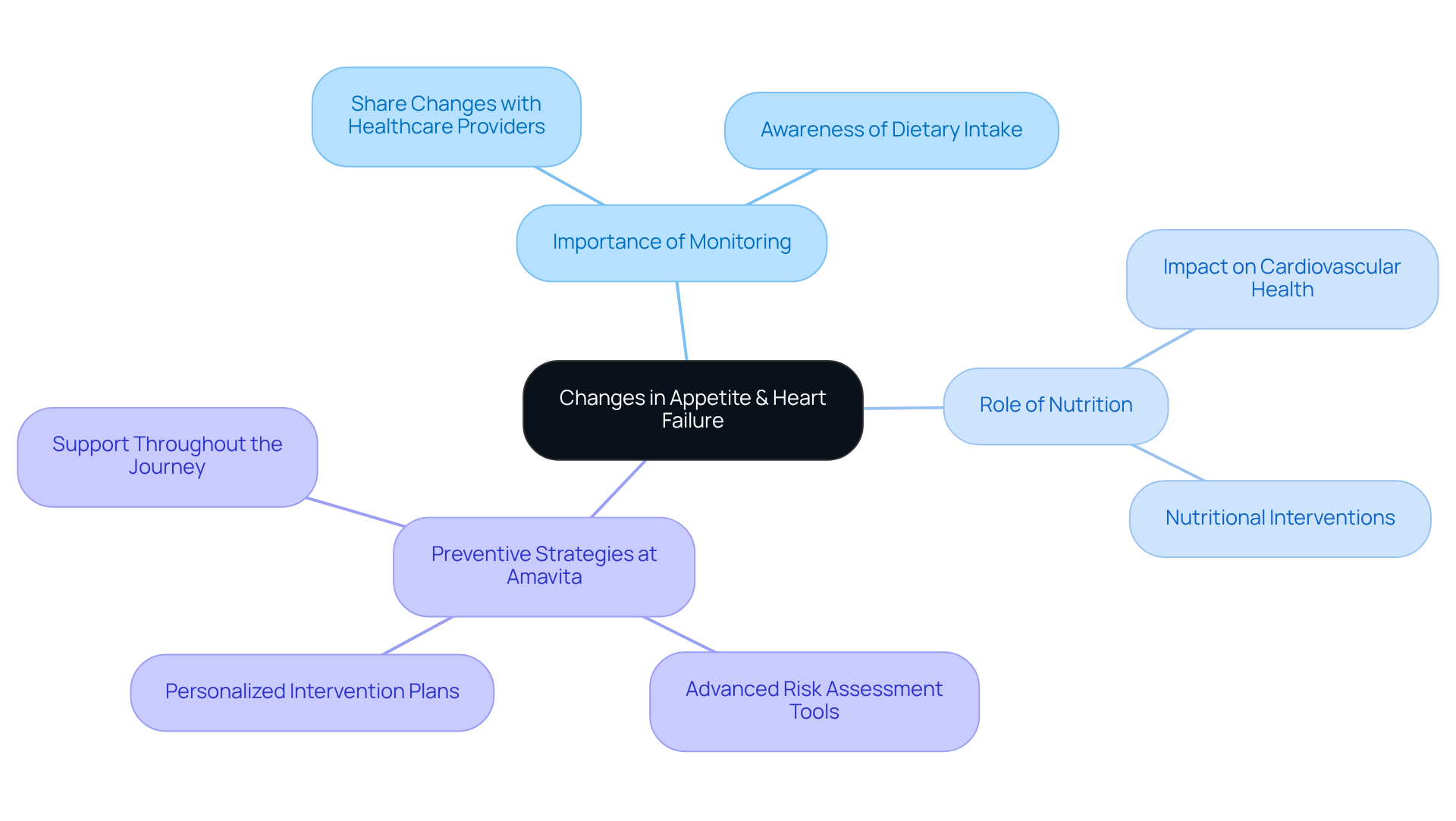
Recognizing the early signs of heart failure in adults is vital for managing your health and improving outcomes. If you experience any combination of symptoms such as shortness of breath, fatigue, or swelling, which may be early signs of heart failure in adults, it's important to seek medical attention—especially if these symptoms worsen or appear suddenly. Remember, timely intervention can significantly improve your recovery prospects and overall quality of life.
Cardiologists emphasize the importance of identifying the early signs of heart failure in adults. Delaying care can lead to serious complications, including worsening heart function or even more severe consequences. At Amavita Heart and Vascular Health®, we are committed to supporting you with our innovative AI-powered diagnostic technology, which plays a crucial role in early detection.
Using a portable, , we provide real-time guidance for accurate imaging. This allows healthcare providers to generate reports on heart structure and function within minutes, facilitating prompt interventions that can greatly enhance your clinical outcomes and reduce the chances of hospital readmissions.
It's essential to maintain open communication with your healthcare providers. Please don't hesitate to report any concerning changes in your condition. Keeping a daily log of your symptoms and scheduling regular check-ups can empower you to take meaningful steps towards better heart health. Together, we can work towards a healthier future.
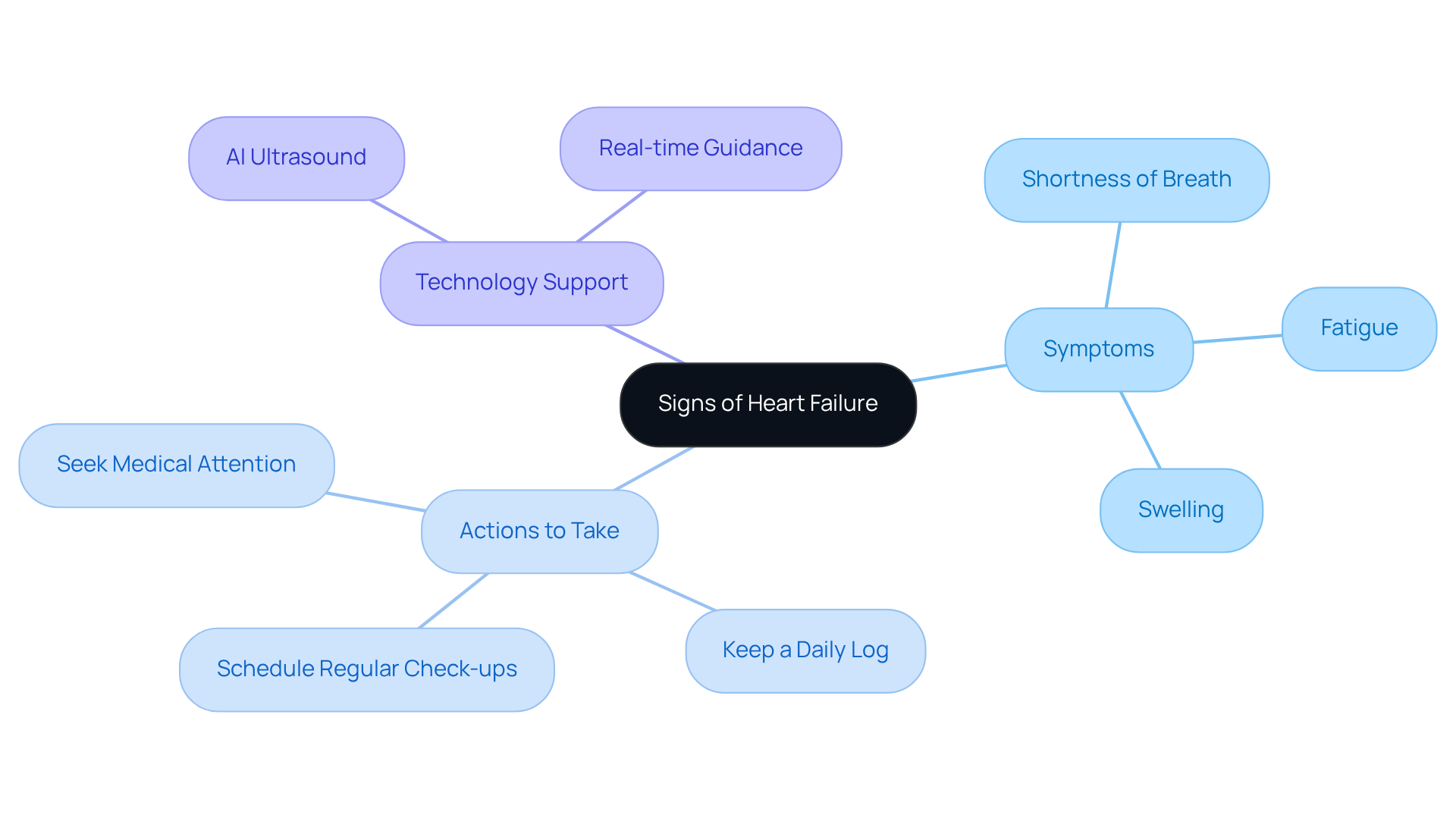
Recognizing the early signs of heart failure in adults is crucial for timely intervention and effective management. This article has highlighted ten key symptoms, including:
Each of these indicators serves as a vital signal that should not be ignored, especially in older adults who are at a heightened risk for heart failure.
In addition to this, the insights shared emphasize the importance of proactive health management. By monitoring symptoms and maintaining open communication with healthcare providers, individuals can significantly improve their health outcomes. The article underscores that timely recognition and response to these symptoms can lead to better treatment strategies, enhanced quality of life, and reduced hospitalization risks.
Furthermore, understanding the early signs of heart failure is not just about awareness; it’s about empowerment. Individuals are encouraged to stay informed and vigilant regarding their heart health. By seeking medical advice when symptoms arise and participating in comprehensive heart failure management programs, patients can take meaningful steps toward a healthier future. Remember, proactive health management can lead to better outcomes and a more fulfilling life.
What is the focus of Amavita Heart and Vascular Health in managing heart failure?
Amavita Heart and Vascular Health focuses on comprehensive heart failure management, particularly for elderly patients, by providing individualized treatment strategies, advanced methods, and minimally invasive procedures to enhance patient experience and recovery.
What is the prevalence of heart failure in elderly patients?
Heart failure affects more than 10% of individuals aged 70 and older, making it a significant concern in this demographic.
How does shortness of breath relate to heart failure?
Shortness of breath, or dyspnea, is a common symptom of heart failure that can occur during physical activity or at rest. It can be influenced by factors such as depression and anxiety, and may indicate underlying valve disease.
What specialized care does Dr. Martinez-Clark offer for valve disease?
Dr. Martinez-Clark offers specialized care through minimally invasive valve treatments that can repair or replace damaged valves without the need for open-heart surgery, leading to improvements in breathing and energy levels.
What should patients do if they notice changes in their breathing patterns?
Patients should be attentive to any changes in their breathing patterns and communicate these changes promptly with their healthcare provider to ensure timely intervention.
What are some key predictors of dyspnea?
Key predictors of dyspnea include age, body mass index (BMI), and the presence of chronic obstructive pulmonary disease (COPD).
What does swelling in the legs and abdomen indicate?
Swelling in the legs, ankles, or abdomen can be an early sign of heart failure, often resulting from edema, which indicates the heart's diminished ability to pump blood effectively.
Why is it important for patients to monitor their weight regarding fluid retention?
Monitoring weight is crucial because sudden changes can indicate worsening fluid retention, and reporting these fluctuations to a healthcare provider is essential for adjusting treatment plans and preventing complications.
What should patients do if they experience leg swelling lasting more than a few days?
Patients should visit their doctor if they experience leg swelling lasting more than a few days, as this warrants a proactive approach for timely intervention and effective management of cardiac dysfunction.